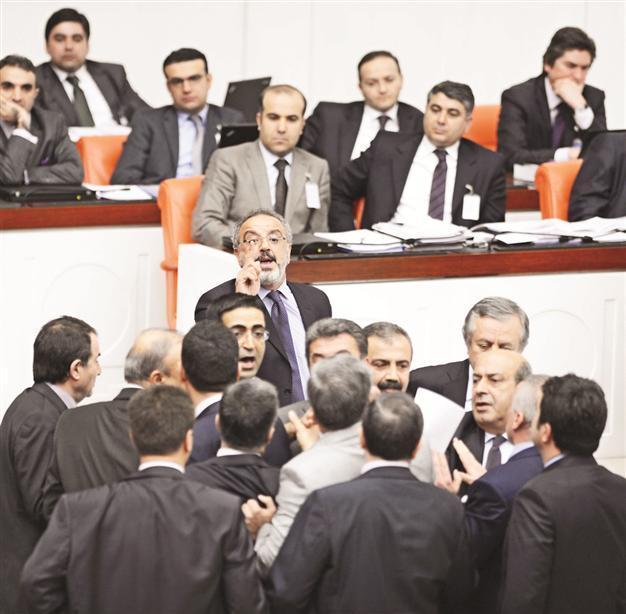AKP carries peace process to charter
ANKARA - Hürriyet Daily News

The Peace and Democracy Party deputy Sırrı Sakık (C) argues with Nationalist Movement Party deputies over defense in mother tongue law. DAILY NEWS photo, Selahattin SÖNMEZ
As the Justice and Development Party (AKP) government tries to take further steps in the peace process that was initiated with the İmralı talks, some regulations that would favor the process have also been added to the agenda of the new Constitution. Lately, a law allowing defense in one’s mother tongue was approved in Parliament. The AKP both tries to make up for the deficiencies in the current Constitution to please the Kurds, and extends the peace efforts into the writing process of the new Constitution, trying to form a basis for a possible solution.The AKP has made some regulations in the new Constitution that would contribute to the solution of the Kurdish issue, covering many subjects such as “constitutional citizenship, education in one’s mother tongue, and bringing certain criteria for abolishing political immunities.” Last week, the AKP’s proposal for the “administrative and public services,” section of the new Constitution showed that the AKP intends to take further steps to ease the peace process. The proposals presented to the commission are crucial, since the AKP has suggested various significant regulations on the matter of local administration, which has been highly discussed amid the peace process.
The AKP’s proposed articles in the “public and administrative section,” of the new Constitution include considerable regulations when the current Constitution is considered. The AKP is taking one more important step in strengthening local administrations, which are often negotiated in the new process. The ruling party proposed a new regulation that would allow new local administration models such as local municipalities.
According to the “local administration,” section of the current Constitution, local administrations are comprised of “provinces, municipalities and villages,” which do not share anything in common with decentralized models. However, the AKP is likely to abolish this three-bodied structure with its new proposal, which reads “local administrations are public entities established to meet the requirements of local communities, whose decision-making bodies are formed with elections and whose establishment principles are determined by laws.”
This expression clearly indicates that the AKP aims to strengthen local administration models rather than a central government model. The regulation also enables various local administration models such as “local municipalities,” which would be formed by elections.
Interestingly, the Peace and Democracy Party (BDP) also submitted a proposal titled “Local and Regional Public Administration.” Like the AKP, the BDP also sides with establishing regional municipalities. While the AKP did not sketch the details of its proposal, the BDP proposed that elections be held every four years.
The AKP’s proposals also include some titles that are often put on the agenda by the BDP as part of their “democratization” efforts. These titles include opening the Supreme Military Council decisions to judicial control, adding civil educational aspects to the curriculums of Military Schools and Police Academies, making the Chief of General Staff dependent on the National Defense Ministry, abolishing martial law and decreasing the state of emergency period from six to two months. The AKP also proposed that “no distinction shall be made in fulfillment of public services,” which is among the titles that would please the BDP. This expression can pave the way for public officers to wear headscarves, while it could also prevent ethnic discrimination.
If speculations are true, the AKP is also preparing for some surprises in the judicial section of the new Constitution. We will together see what will be proposed for that section.
Four ministers renewed
Last week, Prime Minister Recep Tayyip Erdoğan replaced four ministers in the cabinet. Erdoğan did not change the positions of the ministers that would possibly be mayoral candidates in 2014 local elections, except Ertuğrul Günay. Egemen Bağış, Binali Yıldırım, Ali Babacan, and Taner Yıldız, who are expected to become candidates for the municipalities of İstanbul, İzmir, Ankara and Kayseri, respectively, preserved their seats. However, it is being whispered in the corridors that “they will be candidates for presidency in ministry seats, which would reinforce their power.
Chaos in main opposition CHP
The chaos in the main opposition Republican Peoples’ Party (CHP) is ongoing. Last week, an argument between nationalist and Kurdish-origin deputies of the party unveiled a deep ideological dissent that was suppressed for two years. So, will that dispute bring separation within the party? For now, any separation is not expected; however, a sharp controversy is likely to break out during the polls for the new Constitution.











